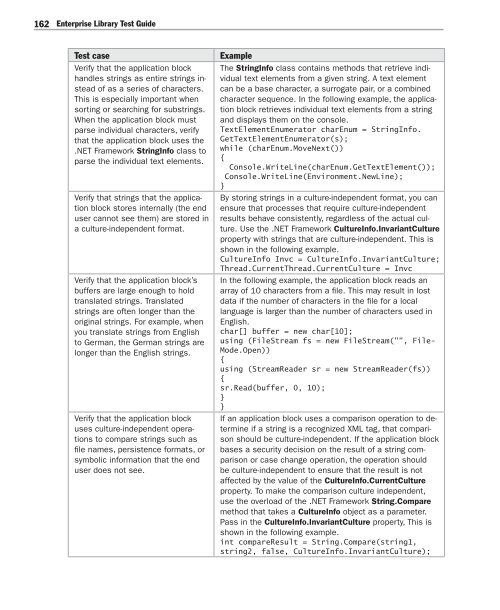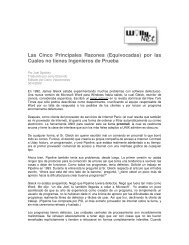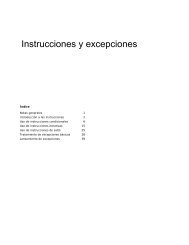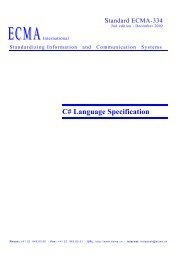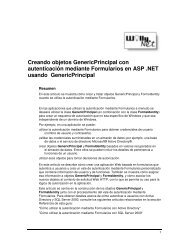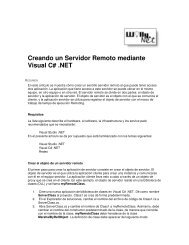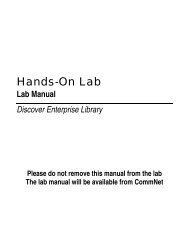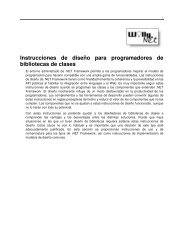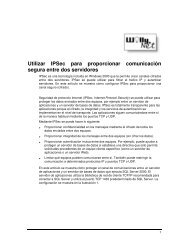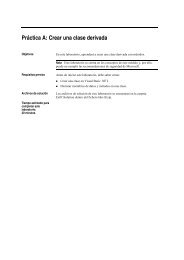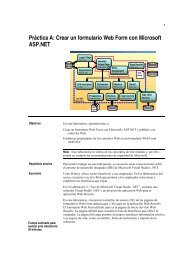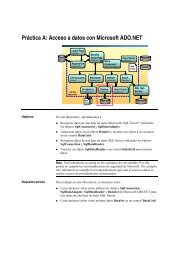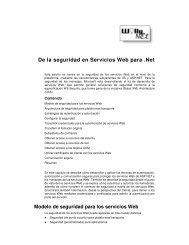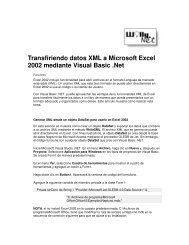Enterprise Library Test Guide - Willy .Net
Enterprise Library Test Guide - Willy .Net
Enterprise Library Test Guide - Willy .Net
You also want an ePaper? Increase the reach of your titles
YUMPU automatically turns print PDFs into web optimized ePapers that Google loves.
162<br />
<strong>Enterprise</strong> <strong>Library</strong> <strong>Test</strong> <strong>Guide</strong><br />
<strong>Test</strong> case<br />
Verify that the application block<br />
handles strings as entire strings instead<br />
of as a series of characters.<br />
This is especially important when<br />
sorting or searching for substrings.<br />
When the application block must<br />
parse individual characters, verify<br />
that the application block uses the<br />
.NET Framework StringInfo class to<br />
parse the individual text elements.<br />
Verify that strings that the application<br />
block stores internally (the end<br />
user cannot see them) are stored in<br />
a culture-independent format.<br />
Verify that the application block’s<br />
buffers are large enough to hold<br />
translated strings. Translated<br />
strings are often longer than the<br />
original strings. For example, when<br />
you translate strings from English<br />
to German, the German strings are<br />
longer than the English strings.<br />
Verify that the application block<br />
uses culture-independent operations<br />
to compare strings such as<br />
file names, persistence formats, or<br />
symbolic information that the end<br />
user does not see.<br />
Example<br />
The StringInfo class contains methods that retrieve individual<br />
text elements from a given string. A text element<br />
can be a base character, a surrogate pair, or a combined<br />
character sequence. In the following example, the application<br />
block retrieves individual text elements from a string<br />
and displays them on the console.<br />
TextElementEnumerator charEnum = StringInfo.<br />
GetTextElementEnumerator(s);<br />
while (charEnum.MoveNext())<br />
{<br />
Console.WriteLine(charEnum.GetTextElement());<br />
Console.WriteLine(Environment.NewLine);<br />
}<br />
By storing strings in a culture-independent format, you can<br />
ensure that processes that require culture-independent<br />
results behave consistently, regardless of the actual culture.<br />
Use the .NET Framework CultureInfo.InvariantCulture<br />
property with strings that are culture-independent. This is<br />
shown in the following example.<br />
CultureInfo Invc = CultureInfo.InvariantCulture;<br />
Thread.CurrentThread.CurrentCulture = Invc<br />
In the following example, the application block reads an<br />
array of 10 characters from a file. This may result in lost<br />
data if the number of characters in the file for a local<br />
language is larger than the number of characters used in<br />
English.<br />
char[] buffer = new char[10];<br />
using (FileStream fs = new FileStream("", File-<br />
Mode.Open))<br />
{<br />
using (StreamReader sr = new StreamReader(fs))<br />
{<br />
sr.Read(buffer, 0, 10);<br />
}<br />
}<br />
If an application block uses a comparison operation to determine<br />
if a string is a recognized XML tag, that comparison<br />
should be culture-independent. If the application block<br />
bases a security decision on the result of a string comparison<br />
or case change operation, the operation should<br />
be culture-independent to ensure that the result is not<br />
affected by the value of the CultureInfo.CurrentCulture<br />
property. To make the comparison culture independent,<br />
use the overload of the .NET Framework String.Compare<br />
method that takes a CultureInfo object as a parameter.<br />
Pass in the CultureInfo.InvariantCulture property, This is<br />
shown in the following example.<br />
int compareResult = String.Compare(string1,<br />
string2, false, CultureInfo.InvariantCulture);


